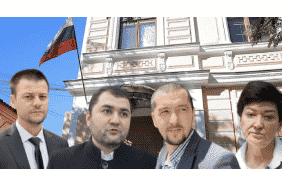At the end of May, yet another wave of detentions and arrests swept through the occupied Crimea. The distinction is that all those detained and arrested this time turned out to be independent Crimean lawyers who regularly work with defendants in politically motivated cases.
This article is about the charges brought against lawyers, the course of their trials, and the consequences these prosecutions will lead to.
Guilty of being a lawyer
Of all four lawyers, only the first detainee, Edem Semedliayev, who has been dealing with dozen criminal cases against Crimean Muslims, was charged with an offense not directly related to his professional activity. On April 16, a user posted a publication criticizing Russia’s war in Ukraine on Semedliayev’s Facebook page. The security officers took a screenshot of this publication, waited for another month, and then detained Semedliayev to draw up a report under Article 20.3.3 of the Code of Administrative Offences of the Russian Federation for discrediting the Russian army. Moreover, Part 2 of the Article, which implies some serious consequences, was referred to.
“This story has nothing to do with the law. The political undertones & pressure on lawyers in connection with their professional activities are obvious. For eight years, they have been dealing with politically motivated cases" ©? 1/
More – here ?https://t.co/OTYKZwgJhR— ZMINA. Human Rights Centre (@zminaUkraine) July 22, 2022
The other three lawyers found themselves in the dock for a much more dubious reason. Half a year ago, Edem Semedliayev worked in one of the police departments after the mass arrests of Muslims near the Crimean Garrison Court. His activity angered greatly Ruslan Shambazov, the head of the Simferopol department of the Center for Combating Extremism, who demanded that the lawyer take off his clothes and demonstrate that there are no extremist tattoos on his body. When Semedliayev refused, a report was drawn up against him for disobeying the lawful demands of police officers and he was detained. At least three of his colleagues – Nazym Sheikhmambetov, Ayder Azamatov, and Emine Avamileva – responded to those actions. At 01:00, when they left the police station, the people who had gathered near asked them to tell them what would happen to Semedliayev and what he was accused of. Half a year later, Shambazov qualified that interview as an administrative offense committed by all three lawyers, namely participation in spontaneous gatherings of citizens that caused violations of sanitary regulations.
On May 26, Konstantin Urazov & Ruslan Shambazov, officers of the Center 4 Combating Extremism in the occupied Crimea, detained Edem Semedliayev. The reason was that an unknown person tagged Semedliayev on a Facebook publication condemning the Russian army’s atrocities in Ukraine
— ZMINA. Human Rights Centre (@zminaUkraine) May 27, 2022




